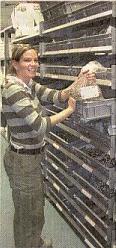VDI nachrichten study: Supply chain optimization in cooperation with Abels & Kemmner
VDI News, Düsseldorf, 19. 5. 06
Would you like to know how high your inventory reduction potential is? If so, then take part in the study “Inventory Management & Delivery Readiness”, which VDI nachrichten is conducting in collaboration with the management consultancy Abels & Kemmner. The consulting experts from Herzogenrath near Aachen are convinced: “There is potential to reduce inventories by up to 30 %.”
ak-online.de/overstock-analysis

For Dr. Götz Andreas Kemmner, there is no longer any doubt that “we have to take action in Germany in order to be able to compete internationally”. According to the managing partner of the consulting firm Abels & Kemmner, Herzogenrath, the focus of this discussion was and is almost exclusively on the labor factor, but in order to maintain international competitiveness, all the screws need to be turned.
Kemmner: “If you look at the balance sheets of German companies, you can see that on average 15.2% of assets are tied up in inventories. However, high inventories are a drag on competitiveness.” Because every euro more in inventories means one euro less liquidity. In addition, most known studies assume that a company has to bear between 19 cents and 30 cents in annual inventory costs for every €1 of inventory.
These inventory costs are not only incurred for interest on capital, as is often assumed, but also for aging and wear, loss and breakage, storage, warehouse management, depreciation, handling and insurance of inventories. With a quasi-interest burden of 19 % to 30 %, inventories are probably the most expensive loan that companies can afford, says Kemmner. In addition, inventories not only cost money, they also act as an organizational lubricant and cover up other weak points in the value chain, which in turn cause considerable costs for companies. Based on numerous projects, Kemmner estimates the inventory reduction potential in an average company in series and variant production at over 20 %. One fifth of the companies would even reach more than 30%. According to the management consultant’s experience, a 20% reduction in inventory in such a company would enable a 55% increase in cash and cash equivalents.
A reengineering project at Montblanc, for example, resulted in a 48% reduction in stock levels and a significant increase in the level of delivery readiness to 98%. The investment in this reengineering project has therefore paid off not only through lower costs and more efficient production, but also through more satisfied customers.
But what causes excessive stocks? “In our experience,” says Kemmner, “numerous factors are involved in high inventory levels, ranging from clumsy planning processes and faulty forecasting methods to incorrect scheduling parameters or product assortment and unfavorable production processes.”
However, if you produce what the market doesn’t need at the moment, you also lack the resources to supply what is needed. In such a vicious circle, inventories continue to rise, delivery readiness decreases and the annual inventory write-downs required increase. Contrary to the hope cultivated by many companies, inventories do not improve market orientation and delivery readiness, warns the consultant, referring to the results of previous analyses. These showed that market-synchronous companies work with significantly lower inventories than their less market-oriented competitors. Kemmner: “The leaner the warehouse, the more competitive production becomes while unit costs fall.”

